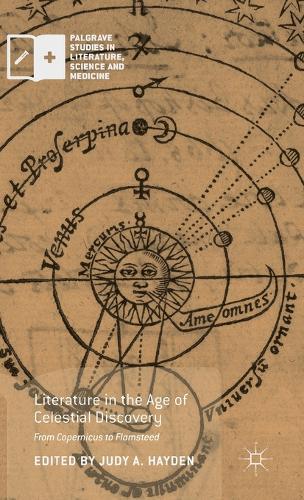Full Product Details
Author: Judy A. Hayden
Publisher: Palgrave Macmillan
Imprint: Palgrave Macmillan
Edition: 1st ed. 2090
Dimensions:
Width: 14.00cm
, Height: 1.40cm
, Length: 21.60cm
Weight: 3.992kg
ISBN: 9781137583451
ISBN 10: 1137583452
Pages: 224
Publication Date: 20 January 2016
Audience:
College/higher education
,
Postgraduate, Research & Scholarly
Format: Hardback
Publisher's Status: Active
Availability: Manufactured on demand

We will order this item for you from a manufactured on demand supplier.
Reviews
This collection of nine essays examines literary responses to the astronomical theories debated throughout the Early Modern period. ... this collection offers a broad look across the literature of this astronomically turbulent period, achieving a balance between examination of the wider cultural issues, and a more in-depth exploration of individual works and authors. (Nicky Atkins, The British Society for Literature and Science, August, 2016)
The essays assembled here powerfully reveal both the surprisingly enduring nature of early modern resistance to the Copernican revolution in astronomy and cosmology and the rich variety of the literary consequences of the emergence of the New Science. By drawing critical attention to a great range of topics and texts across the long-seventeenth century, this collection brings new concerns and vital insights to the current critical conversation regarding the complex and intriguing relationship between early modern science and literature. - Howard Marchitello, Professor of English, Rutgers University, USA The early modern period witnessed an extraordinary convergence of astronomy and literature. Copernicus and Galileo prompted new questions: Did the earth move? Were there more worlds than one? Might other planets be inhabited? Literary writers answered these questions, and this bracing and original collection of essays illuminates the literary response to astronomical revolution, from Europe to America, across languages and times, and will be welcomed by all students of the period. - William Poole, John Galsworthy Fellow and Tutor in English, Oxford University, UK
The essays assembled here powerfully reveal both the surprisingly enduring nature of early modern resistance to the Copernican revolution in astronomy and cosmology and the rich variety of the literary consequences of the emergence of the New Science. By drawing critical attention to a great range of topics and texts across the long-seventeenth century, this collection brings new concerns and vital insights to the current critical conversation regarding the complex and intriguing relationship between early modern science and literature. - Howard Marchitello, Professor of English, Rutgers University, USA The early modern period witnessed an extraordinary convergence of astronomy and literature. Copernicus and Galileo prompted new questions: Did the earth move? Were there more worlds than one? Might other planets be inhabited? Literary writers answered these questions, and this bracing and original collection of essays illuminates the literary response to astronomical revolution, from Europe to America, across languages and times, and will be welcomed by all students of the period. - William Poole, John Galsworthy Fellow and Tutor in English, Oxford University, UK
Author Information
Judy Hayden is Professor of English at The University of Tampa, USA.




